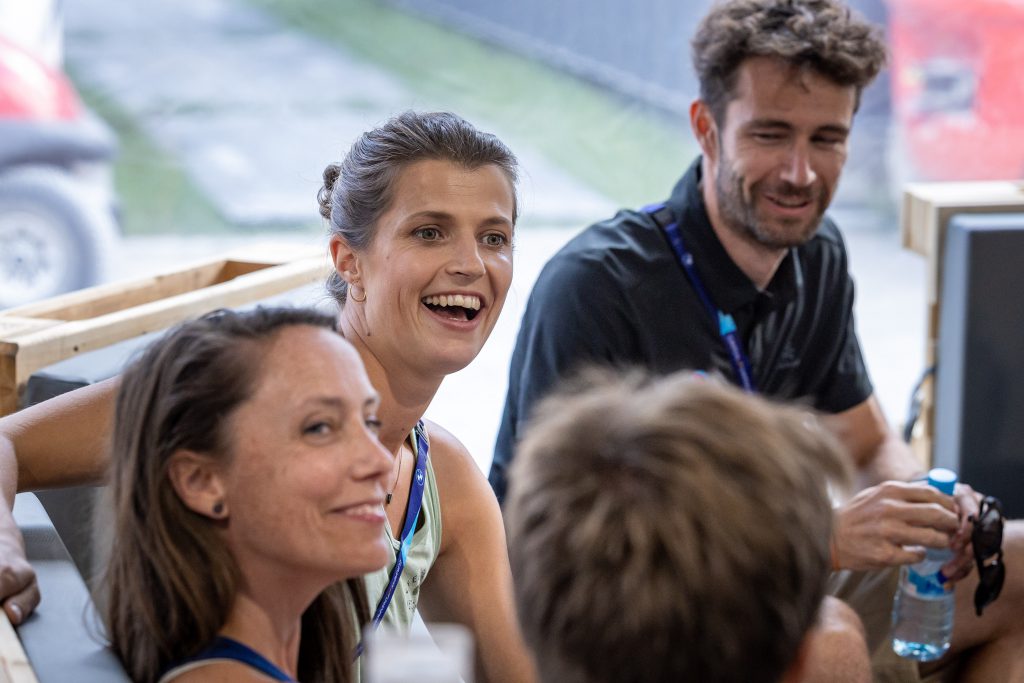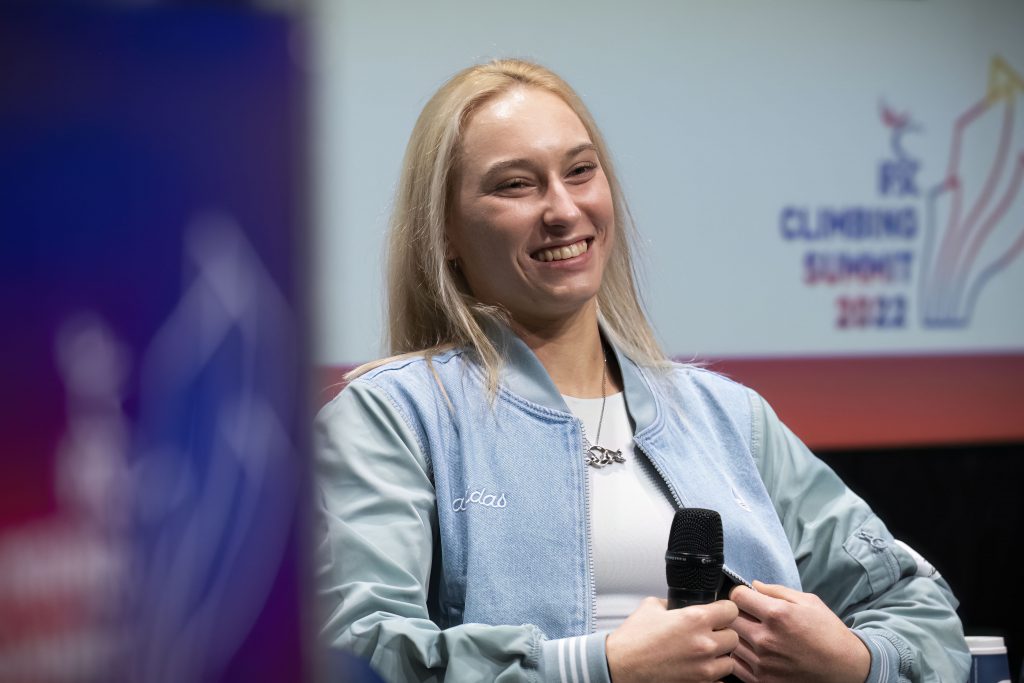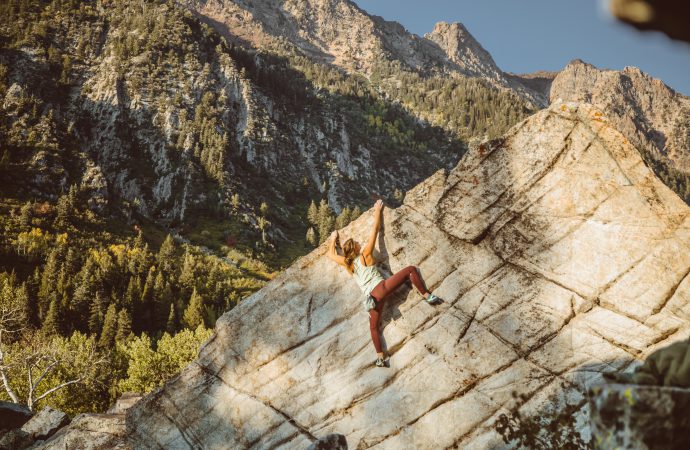French former national champion climber Charlotte Durif discusses her position as chair of the IFSC European Council’s Sustainability Commission
A six-time Youth World Championship medallist in sport climbing, 32-year-old Frenchwoman Charlotte Durif has spent more time in the great outdoors as a rock climber and bolter since retiring from indoor events in 2016, with a recent film documenting her achievement of climbing 700 routes over 8a grade.
However, she has remained closely involved with the discipline that brought her so much early success, and has had a front-row seat as it has become an Olympic sport and continued to boom in popularity, with more and more climbing gyms springing up across the globe.
Durif worked as a commentator during the sport’s Olympic debut in Tokyo in 2021, has previously served as chair of the International Federation of Sport Climbing (IFSC) Athletes’ Commission, and most recently was appointed the athlete representative on the IFSC’s European Council, for whom she has been tasked with leading a Sustainability Commission – a role that blends her passions for climbing and the environment. Formed in 2021, the Commission has already implemented some innovative measures designed to make sport climbing events in Europe more sustainable.
Rewarding environmental ambition
“At the end of 2020, there was motivation among a few of us to form a working group around sustainability, mostly environmental,” explains Durif (below image, centre), who is also an engineer with a doctorate in material science.

“We worked on it throughout 2021 and created a Sustainability Award for event organisers, which was mostly to bring awareness into good practices. We came up with a list of actions that could be taken during the competition, the organisers’ points were calculated, and then at the end, depending how many points they got, we would award either a bronze, silver or gold medal.”
At the end of 2021, the IFSC European Council awarded the first recipients of the IFSC Europe Sustainability Award, with three event organisers “winning” silver medals and two more awarded bronze after performing well against criteria such as accommodation, energy, food and drink, merchandising, transport and waste management. The Award is now being given out annually, and the hope is that the best practices highlighted will inspire other event organisers – not just in Europe, but worldwide – to replicate them and make their own events more sustainable. It’s a concept that introduces some friendly competition among event organisers while promoting innovation and collaboration.
Since then, that initial working group has evolved into the IFSC European Council Sustainability Commission, chaired by Durif, and the members held a series of virtual and hybrid meetings in 2022. They also organised a sustainability workshop for national federations at the IFSC Europe Plenary Assembly, and an informal roundtable held on the fringes of the IFSC’s flagship European event of 2022, the European Championships, which took place in Munich last summer as part of the successful multi-sport competition.
Hosted in the athletes’ lounge at the Königsplatz venue, invitations to the roundtable were extended to athletes, coaches, judges, route-setters, technical officials and others, who talked about the measures they can all take to make sport climbing events more sustainable. Durif led the discussions alongside IFSC Europe Executive Board President Tijl Smitz and Federico Ferro, who heads up sustainability projects at the IFSC. Ferro explained that the IFSC has been a member of the Sport for Climate Action Framework since 2021, and outlined the IFSC’s Sustainability Guidelines, published in 2020, which provide practical information for member federations and event organisers structured around environmental, social and economic sustainability.
Other topics that were raised by participants included the competition schedule, and better aligning the tour so that travel to different continents is less frequent; resource management, addressing energy, water and recycling; and the procurement and reuse of climbing walls and holds, which can be challenging due to the range of providers and the aesthetic requirements at different venues related to different styles and colours.
“The idea was not so much a workshop, but more to speak with all entities from climbing competitions to be better as a whole,” explained Durif. “We’ve now produced a report to look into the ideas and feed into our strategic plan for the next four years.”
Also in Munich, Robby Toth, the high-performance manager for the Belgian climbing team and a member of Durif’s commission, gave a presentation on sustainable event travel to a Young Leaders Forum made up of delegates from the sports represented at the European Championships. Toth explored the challenges that can present themselves when trying to travel with less impact, such as balancing more environmentally-friendly accommodation with rules that men and women, or athletes and coaches, cannot stay in the same room.
“We need more practical solutions that everyone can execute on a daily basis to show the world that change is possible,” said Toth. Only then can we make the steps required to change the tide.”
Climbers as climate advocates
Engaging with athletes about sustainability is a priority for Durif, who believes that professional sport climbers are extremely well placed to influence others’ behaviours. The sport has exploded in popularity since its addition to the Olympic programme – something that Durif campaigned for – and athletes such as Czech world champion Adam Ondra and Slovenian Olympic champion Janja Garnbret (below image) command huge followings on platforms such as Instagram and YouTube, and have shown interest in lending their voice to the climate action movement.

“I think because of the nature of climbing, and where climbing brings us, we’re naturally pretty aware of the environment and environmental issues,” says Durif, who remains close to nature through her climbing and her role in adventure film production company Cold House Media.
However, she acknowledges that climbers face the same accusations of hypocrisy as athletes from other sports who must sometimes travel long distances to compete at the highest level.
“Climbers are not perfect, and this is the big problem with sustainability; we cannot be perfect,” she adds. “It is a tough topic, because we’re in this international, elite competition of climbing, which for a lot of them is not just their passion – it’s their life.
“But I feel like as climbers, we’re pretty careful and aware of this aspect. And if you go on social media, there are athletes naturally bringing it into their conversations and their image, which is good.”
Durif highlights the example set by Germany’s Alexander Megos, who follows a vegan diet and didn’t take a flight in 2022, preferring to cycle or take the train to events in Europe.
“He’s definitely very dedicated to environmental protection,” she says of the 29-year-old, who counts Patagonia among his sponsors. “He’s being very proactive and talking about it, and associating with brands in a better, more impactful way for environmental protection.”
It’s an example that Durif hopes and believes that others will follow.
“Some of our climbers are public figures now, in a way,” she says. “Nowadays, we need those people to inspire others. And they want to fight for it, because it’s our future.”
Opt into our weekly newsletter for exclusive content focused on sustainability strategy, communication and leadership for sport’s ecosystem.










Leave a Comment
Your email address will not be published. Required fields are marked with *